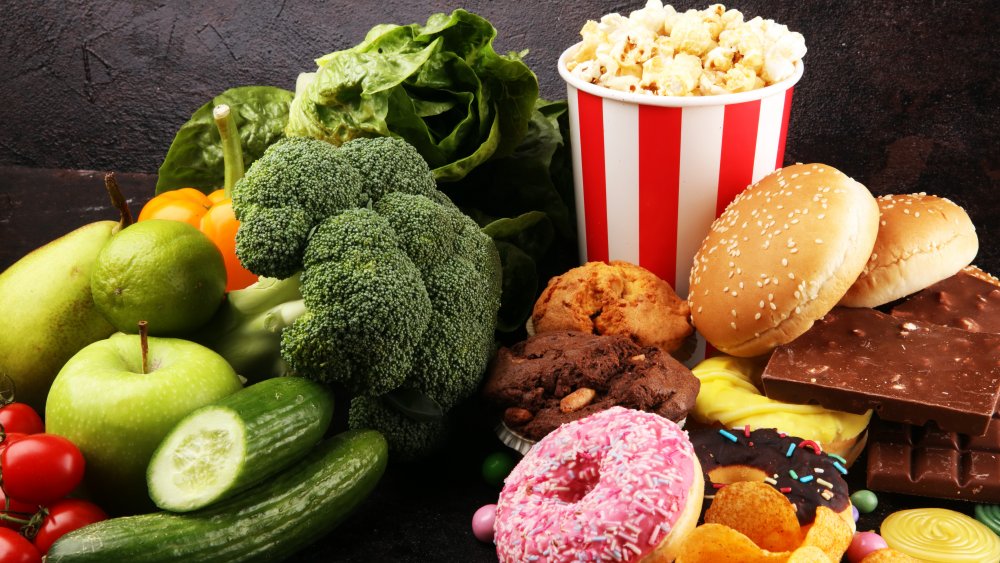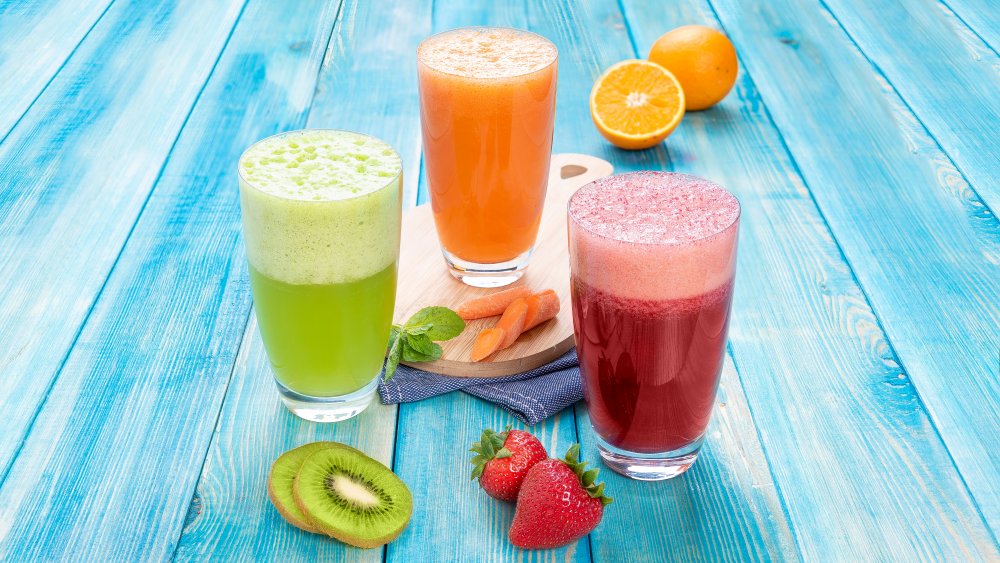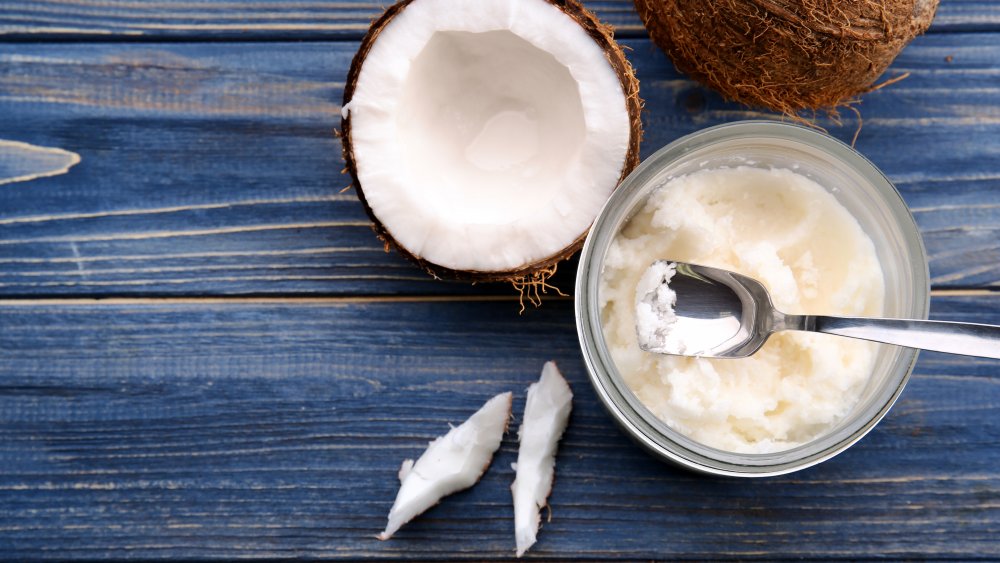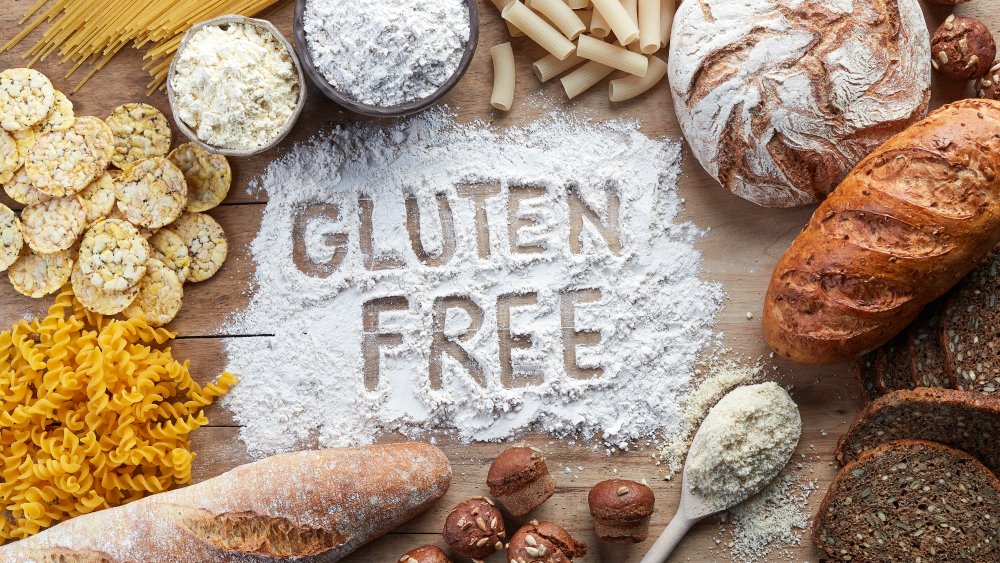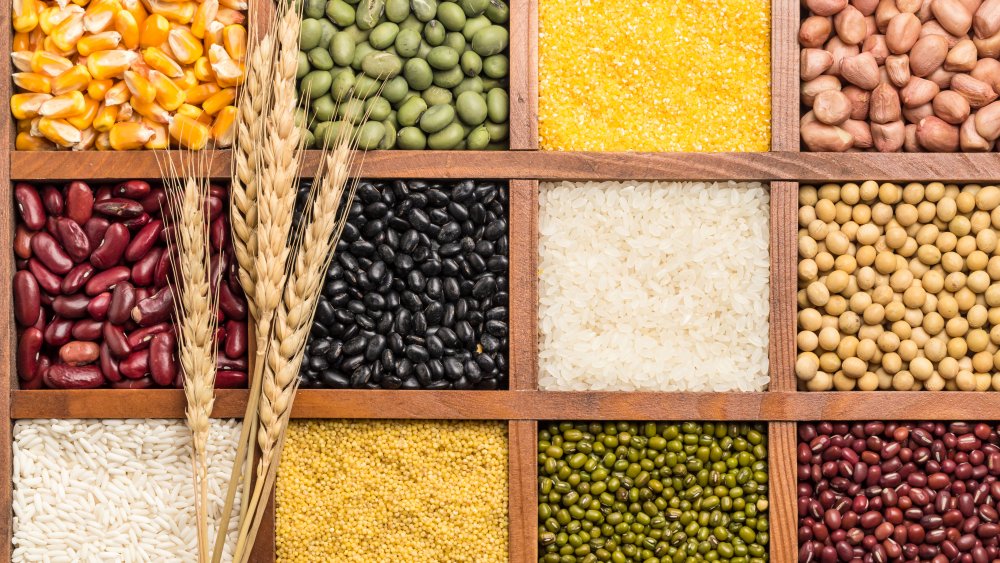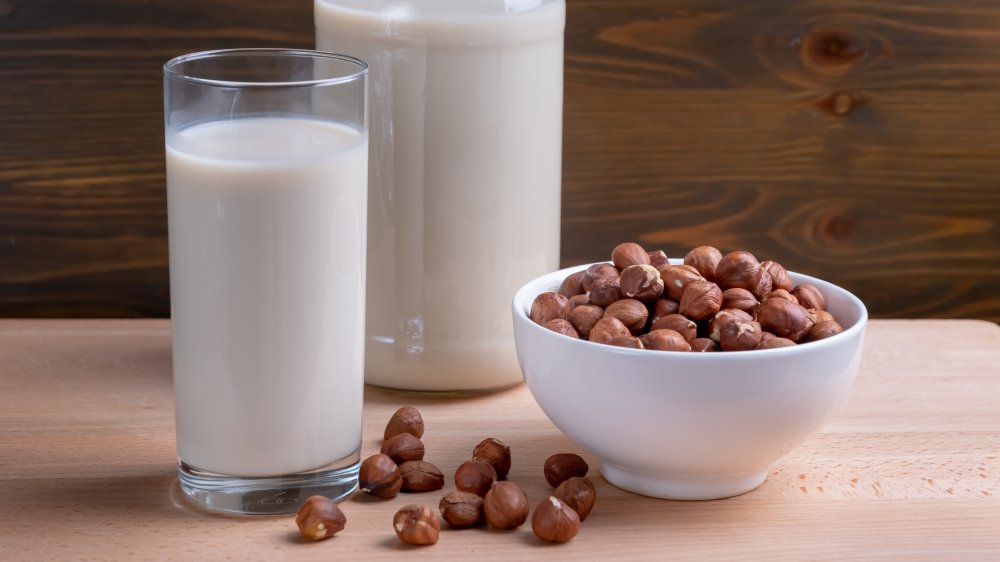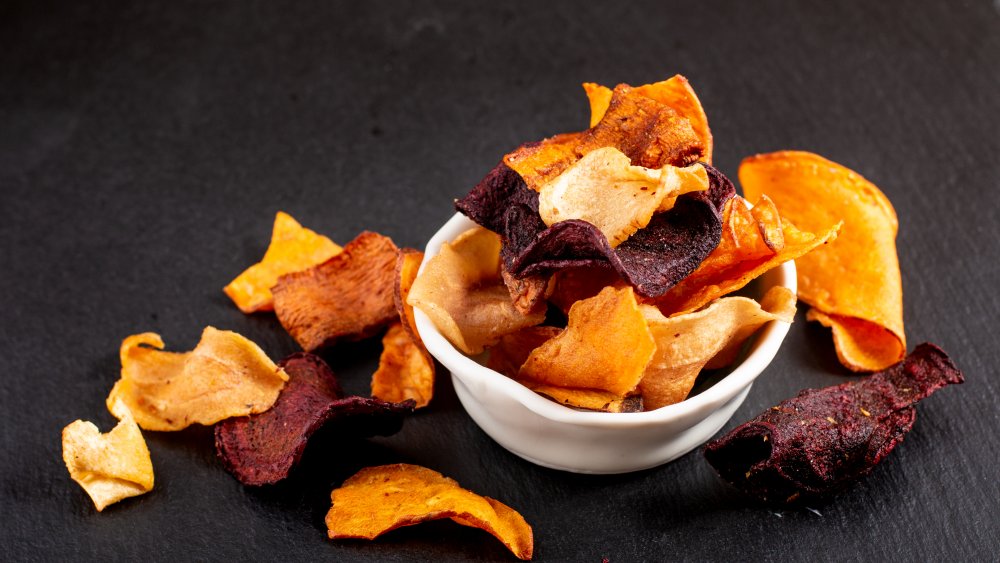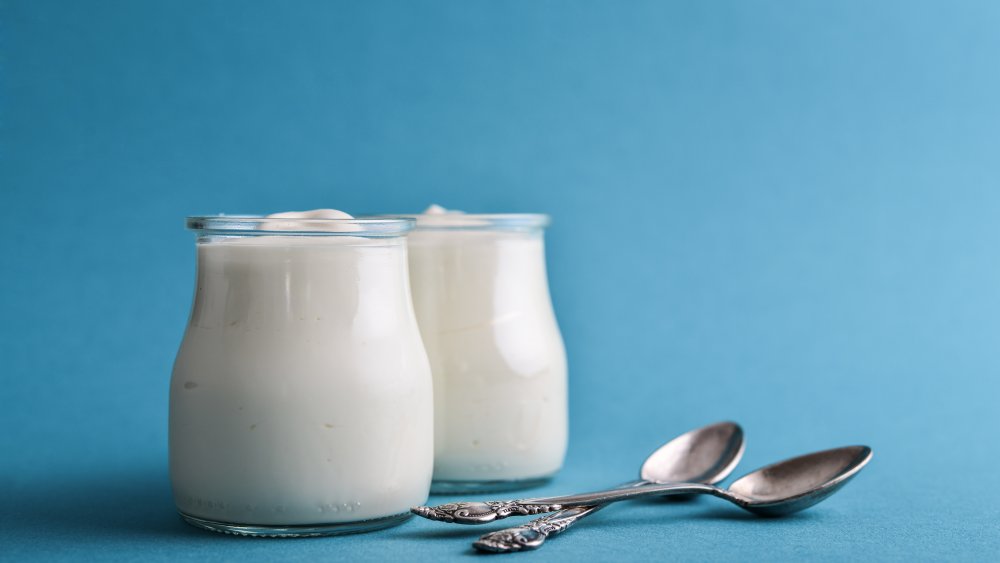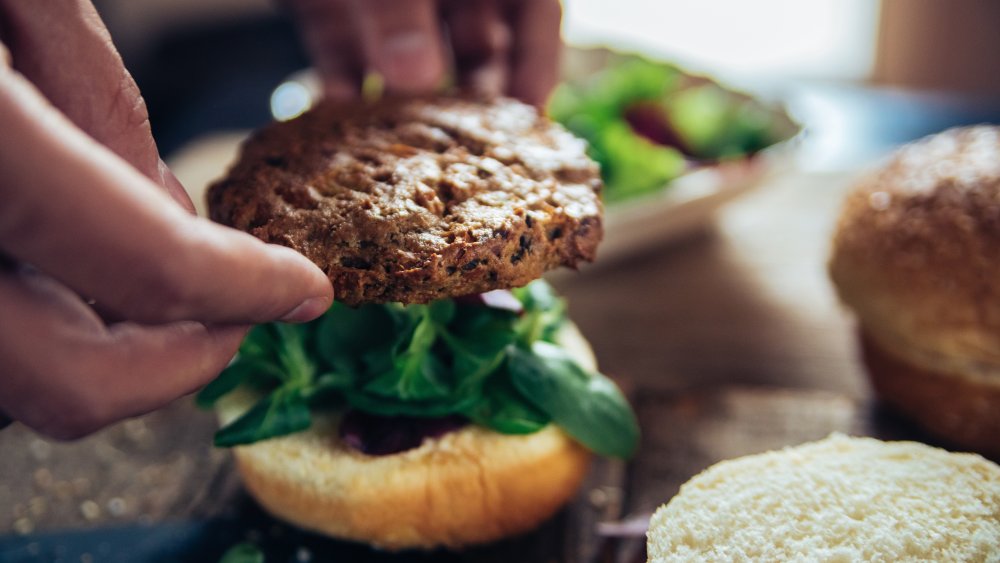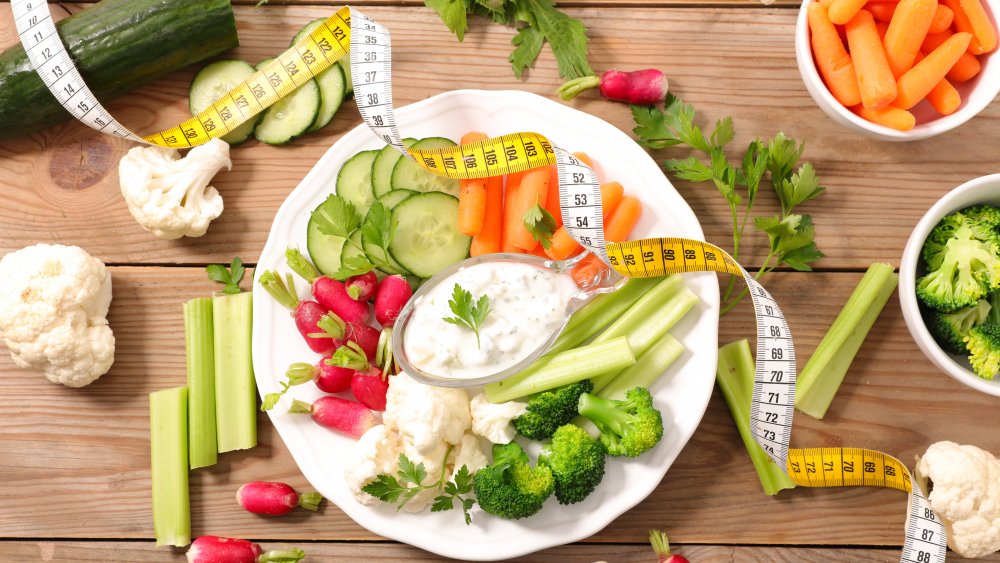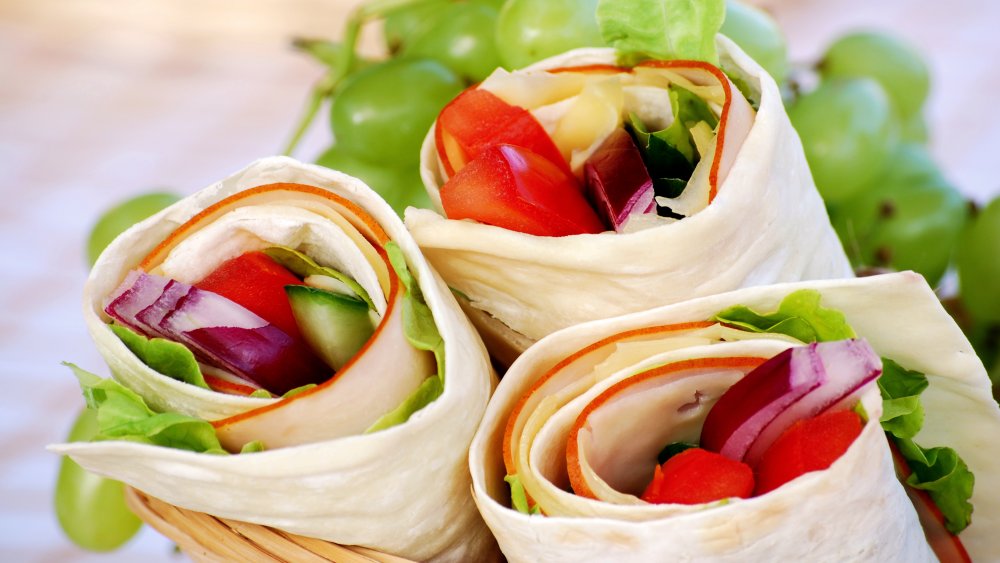Popular Foods That Were Deemed Terrible For Your Health This Past Decade
The health and wellness market is booming — and according to Statista, it's on a steady increase, projected to hit over $811 billion by 2021. The idea that magical superfoods can give us energy, help lose weight, and make us feel better is a powerful thing, and people are constantly buying in.
Superfoods are everywhere, and while there are a few new food trends that will absolutely take over in 2020 (we're looking at you, oat milk), a few have fallen by the wayside. This decade saw the rise of many healthy foods, but it also saw more than a few that got debunked for their non-magical abilities.
Since 2010, several popular foods have been outed as being significantly unhealthier than we initially thought. Some are way higher in sugar than you'd think, and others contain iffy ingredients that can lead to more serious health problems like heart disease or diabetes.
You might be surprised to find some of your favorite "healthy" foods on this list, so sorry to break it to you that these popular foods are actually pretty terrible for your health.
Juice and juice cleanses aren't as beneficial as we thought
Juice has been around for a while. So long that there's a reference to it in the Dead Sea Scrolls. Written between 100 BC and 70 AD, the document recommended to drink "a pounded mash of pomegranate and fig" if you were looking for "profound strength and subtle form."
Then, of course, there was the orange juice craze: Quartz reports that in 1960, Americans were drinking 20 pounds of the orange drink each year. Consumption of orange juice has been declining for decades, and a 2019 study published in the Journal of the American Medical Association might reveal why: The sugar content in juice makes it just as bad for you as soda. The study revealed that every 12-ounce serving of fruit juice for males aged 45 and older — even 100 percent all-natural fruit juice — is linked to an 11 percent higher risk of death, and it gets worse with multiple servings.
It turns out it's not just fruit juices. Other popular types of juice (like all those detox cleanses we've been hearing about for the last decade) aren't great for our health, either. A 2015 Los Angeles Times article referenced several health experts that state "there's no data whatsoever" supporting the efficacy of juice cleanses. Not only that, but juicing removes the healthiest part of fruits and vegetables — the fiber — leaving behind sugar water. Without the fiber, you won't feel full, and you'll feel hungry again after the sugar rush dies down.
That expensive juicer sitting in your kitchen may no longer be your handiest appliance.
Coconut oil is dangerously high in saturated fat
There are few oils as controversial as coconut oil, and 2010 saw its popularity rise and fall.
Coconut oil has been used for centuries in tropical regions where coconut trees flourish — Southeast Asia, Africa, and Southern and Central America — but its introduction to American cooking is relatively recent. Between 2011 and 2015, the oil saw a surge in popularity, thanks in large part to celebrity endorsements like Dr. Oz. In an episode of the Dr. Oz show, Oz called the product a "miracle food" that had "super powers" to heal your body, help you lose weight, and treat ulcers. Keto and paleo dieters also adopted the oil thanks to its medium chain triglycerides (MCTs), which are used by the body as "ketones," an energy source.
The only problem? Coconut oil is unusually high in saturated fats: It contains 90 percent saturated fat, as compared to butter's 64 percent and lard's 40 percent. Consuming excess saturated fat raises bad cholesterol levels, which can increase the risk of heart disease.
It's so bad, a Harvard professor famously called it "pure poison" in a video lecture that went viral with over a million hits in 2018.
You'll still find some die-hard coconut oil users, but most of us are rethinking its use and are trying to use it in moderation only.
Gluten-free foods aren't as healthy as you might think
Once upon a time, the word "gluten" wasn't in most Americans' vocabulary. After all, celiac disease — the autoimmune digestive disorder that causes the body to attack gluten found in wheat, rye, and barley — only affects one in 141 Americans (or 0.7 percent of the population).
Somewhere along the way, more and more people began adopting gluten-free diets for health reasons. NPD market research group found a steady increase in gluten-free diets among American adults between 2010 and 2012, measuring at least 27 percent of the population.
It's no surprise that companies began ramping up production of processed gluten-free foods to meet the demand, like breads, pastries, snacks, and gluten-free alternatives to pasta.
You would think that gluten-free foods would be healthy, but Today reported in 2014 that "the science is still out" about whether gluten-free diets are healthy for non-celiac individuals. Cutting out gluten doesn't automatically translate to losing weight. In fact, many gluten-free products actually have more calories than their gluten-filled alternative because they're higher in sugar.
Even the Gluten-Free Society cautioned its followers in 2016 that processed gluten-free foods are actually anything but healthy: Many of these products contain cheap GMO grains like corn, sorghum, and rice, and they usually contain many unhealthy fillers.
Egg whites aren't any healthier than whole eggs
Remember when everyone looked to egg whites as the cholesterol-free way to enjoy eggs?
If you actually like the flavor and texture of egg whites, never fear; it's still true that going yolkless is a protein-packed way to save you from consuming excess cholesterol and calories. An egg white contains 4 grams of protein, 17 calories, and zero cholesterol as compared to a whole egg's 6 grams of protein, 71 calories, and 186 milligrams of cholesterol. The latter sounds pretty bad considering that the American Heart Association recommends no more than 300 milligrams of cholesterol a day to lower the risk of heart disease and diabetes.
Luckily for those of us who like the flavor of the yolks, studies that have come out since 2010 have dispelled the myth that egg whites are healthier than consuming whole eggs. A 2013 study showed that, for the vast majority of people, dietary cholesterol doesn't have that great of an effect on blood cholesterol. That means that most people can eat up to one egg per day without risk of developing heart disease or stroke.
That's great news, because those egg white omelettes we were eating at the beginning of the decade were kind of depressingly tasteless.
The whole-grain stamp might not be enough
Carbs have been under attack throughout the 2000's, but whole grains are on the rise — among adults in the U.S., consumption rose as much as 26 percent between 2006 and 2016 (from 12.6 percent of total grain intake to 15.9 percent of total grain intake).
Refined grains like white flour and rice are milled to remove the bran and germ, which improves their shelf life but removes vital nutrients. By comparison, whole grains like brown rice, wheat berries, and oatmeal are higher in nutrients and fiber, and they've been linked to a lowered risk of obesity, diabetes, and heart disease.
Unfortunately, in 2014, the Harvard Gazette reported that many foods with a whole-grain stamp aren't as healthy as you might think.
A study by Harvard School of Public Health (HSPH) researchers looked at 545 grain products from major U.S. grocery stores. They determined that the foods with the whole-grain stamp were higher in fiber and lower in unhealthy trans fats, but many of those foods were also higher in calories and sugar than comparable products without the stamp. Their conclusion was that it's not enough to look for whole-grain ingredients; they recommend looking for "a ratio of total carbohydrate to fiber of equal or less than 10-to-1" for the food to be truly healthful.
Nut milks may not be more healthful than dairy milk
Nondairy milk is nothing new. According to the Smithsonian, soy milk has been around in China since the 14th century; coconut milk formed "the backbone" of Southeast Asia, Indian, and African cuisine for centuries; and almond milk reached Europe via the Middle Eastern Moors in the 8th century.
Their rise has been notable in the U.S. over the past few years, though; Mintel reports that dairy milk sales have been declining as consumers are more and more interested in non-dairy nut milks, where sales have grown 61 percent since 2012.
These plant-based milks have gained a lot of traction among health enthusiasts because of their high levels of vitamins, minerals, and protein content. It isn't all good, though. Research from 2013 showed that many of these products use carrageenan as a thickener. This seaweed extract might cause digestive issues, and it may even lead to glucose intolerance that causes diabetes. So if you're into alternative or plant-based milks, make sure to check your ingredients label carefully!
Agave nectar is not the best sugar substitute
The agave plant has been used in Mexican cuisine for thousands of years. They used it as a sweetener and (most famously) fermented its natural sugars to create tequila. Somewhere along the way, it became everyone's favorite sugar alternative.
In 2011, fans of the Dr. Oz show listed their all-time favorite tips and recommended products for losing weight and increasing their energy. Wonder what the number one suggestion was? Agave nectar as a sugar substitute. It wasn't just Dr. Oz, either; Oprah suggested using agave as a sugar substitute, and The Mercury News reported that its use as an ingredient in commercial products jumped from 60 to 304 products between 2003 and 2008.
Then, in 2014, Dr. Oz dropped a bomb: "After careful consideration of the available research, today I'm asking you to eliminate agave from your kitchen and your diet."
People were initially drawn to this sweetener because it's low on the glycemic index, and although it contains the same number of calories as sugar per teaspoon, you don't have to use as much of it because it tastes sweeter. Unfortunately, the research has shown that it contains too much fructose — 85 percent, which is way more than regular sugar. Consuming too much of this type of sugar compound can raise your risk of type 2 diabetes.
Veggie chips and veggie straws are too good to be true
People in the U.S sure do love potato chips: Grand View Research reported that the potato chip market was valued at $7.74 billion in 2016. So it's only natural that we turned to veggie chips as a way to eat more vegetables but enjoy them in the same, crunchy package as potato chips. They certainly seem like a nutritious and healthy alternative to potato chips, and veggie straw products even started making their way into school lunches.
If it sounds too good to be true, it probably is, and that's certainly the case here. In 2017, the New York Post reported that two men sued Hain Celestial Group because their Garden Veggie Straws product doesn't actually contain any vegetables. These products are basically potato chips: They're made with potato starch and corn starch and colored to look like vegetables using tomato paste and spinach powder.
It's not just the straws, either; according to Time, many popular brands of vegetable chips are also just potato chips disguised as other vegetables using colors and dyes. Sadly, Time also revealed that brands like Terra that use actual vegetables are still deep fried, which can cause inflammation and elevate the risk of heart disease.
Yogurt doesn't have a beneficial health impact on our bodies
Yogurt wasn't popular in the United States until it was advertised as a "health food" during the 1950s and 1960s. It really picked up after Dannon filmed a commercial in the Soviet Union in 1977, which insinuated you could live as long as the 100-year-old people in the commercial if you ate their product.
It's true that yogurt is high in protein, calcium, and vitamins, and we thought that the probiotics (live microorganisms inside the yogurt) have a beneficial impact on the body when consumed. But we may have been wrong.
A 2015 study involving more than 4,000 thousand people determined that regular consumption of yogurt doesn't have any beneficial health impact on our bodies. Not only that, but not all yogurt is even healthful at all. Some yogurts have excessive amounts of sugar (especially the fruit-on-the-bottom or flavored varieties), and they often contain harmful additives, too. A registered dietitian told Self Magazine that these additives could actually feed the bad bacteria in our guts — which is pretty much the opposite of what we're trying to when we eat yogurt.
Veggie burgers aren't everything they promise
If 2019 saw the rise of anything, it was meatless burgers like the Impossible Burger. Of course, vegetarian burger patties have been around since the 1980s, but this new brand of meatless burgers promises the same flavor as meat, all without harming the planet.
That's quite appealing to the rising number of vegan, vegetarian, and plant-based eaters. If only it was true, but even the CEO of Whole Foods came out to say that plant-based meats aren't really that healthy.
In 2018, Insider interviewed a registered dietitian nutritionist who dispelled a lot of myths about veggie burgers. First off, just because they have the word "veggie" in the title doesn't mean they actually contain any vegetables. They're often made with grains like quinoa or black beans, but they can also contain a lot of unhealthy filler ingredients. Some may not even contain sufficient amounts of plant protein, which means they won't fill you up or keep you feeling full.
To add insult to injury, veggie burger patties often contain high levels of sodium to add flavor, and too much sodium can lead to high blood pressure and other health woes.
"Diet" and low-fat foods don't live up to their promise
According to Business Wire, the U.S. weight-loss industry was valued at $72 billion in 2019, and it's not getting lower anytime soon.
Healthy eating is confusing and seems to change every few years, so it's easier to reach for diet or low-fat foods. Who can keep track of if eggs are good or bad for your health, whether fat is the demon or it's an essential part of high-fat diets like keto, or whether you should cut out carbs to lose weight (unless they're complex carbohydrates, then it's fine)?
Sadly, reaching for diet or low-fat foods isn't the answer. A 2016 study published in the Journal of the Association for Consumer Research found there's a psychological connection between "healthy" food and how filling consumers perceive the food to be. In the study, they revealed that food labeled as "diet" food could actually lead to weight gain because they cause overeating.
So what about the "low-fat" labels? The Telegraph debunked those foods too in 2014, revealing that they often contain as much as five times more sugar than full-fat alternatives.
Studies revealed that wraps aren't any healthier than sandwiches
In the wake of the low-carb craze, wraps have risen to the top. Bread sales have been declining since the Atkins diet was popular in the 1990s, and The Guardian reports that they haven't really been able to recover since.
Instead, people are turning to so-called healthier options, like pita bread or wraps. If you prefer your food wrapped up in a tortilla as opposed to sandwiched between two slices of bread, you can continue your normal lunchtime routine. But if you're only eating wraps to save calories and carbohydrates, we hate to burst your bubble; they're not as healthy as you think.
A 2015 study by SafeFood found that the contents of the wrap matter more than whether it's made with bread or tortillas. Some wraps were as high as 1,000 calories and contained high levels of both sodium and fat.
It makes sense when you look at the side-by-side nutrition information for whole-wheat wraps and two slices of whole-wheat bread, as Very Well Fit did in 2019. They found very little difference between the two. The only notable difference was that some tortilla brands are also high in unhealthy trans fats and are made with hydrogenated oils, which are even worse for your health.
Even the wraps that might sound healthier (like spinach wraps) are made with dyes and don't actually contain extra nutrition or fiber.
